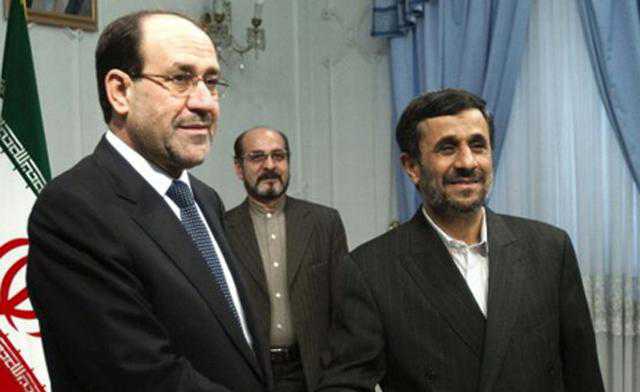By DINA AL-SHIBEEB
Al Arabiya

Iran’s president Mahmoud Ahmadinejad (R) shakes hands with Iraq’s prime minister Nouri Al-Maliki during an official meeting in Tehran. (File Photo)
Turkey, Iran, Iraq and Syria are to establish a common visa system, the Russian agency Regnum quoted the Iranian vice-minister of tourism as saying on Tuesday.
The four states are preparing to install a “Schengen-like” regime, Shahbaz Yezdi said, in reference to Europe’s Schengen Zone. Under the system, one visa is issued and travelers can move between 25 of the European Union’s 27 countries without needing a visa for each country. The United Kingdom and Ireland do not subscribe to the Schengen system
Mr. Yezdi also said that the initiative was based on an idea of Prime Minister Recep Tayyip Erdogan of Turkey.
“Putting into place uniform visas for the four countries will actively boost the development of tourism,” Mr. Yezdi said.
In 2010, the currently embattled Syrian president Bashar al-Assad proposed a visa-free travel region for Syria, Iran, Turkey and other neighboring countries, and he said that he was the first to advent the issue starting with a visa-free travel between Turkey and Syria.
The fact that former foes Iraq and Iran would share a common system would be quite remarkable, especially in view of their bitter history. Iraq has fought Iran for eight years from 1980 to 1988.
But Iraq has since mended relations with Iran as both now have Shiite-dominated governments.
Just like Iran, Iraq raised its concern over troops from the United Arab Emirates and Saudi Arabia going to Bahrain as unrest by the Shiite-led opposition escalated. Iraq has joined Iran in describing the move as interference and against Bahrain’s sovereignty. But the Gulf countries see the threat against one Gulf country as a threat on all six.
Meanwhile, the six countries belonging to the Gulf Cooperation Council are also inching to cement their bloc. Recently the Gulf States’ economy and finance ministers initially agreed to lift hurdles for GCC nationals to own real estate in other Gulf States and to facilitate flow of capital money with the Gulf region.
GCC nationals now can enter other Gulf States only with an identity card. But unifying the region’s currencies still seems like a distant proposition.
Prior to the current unrest in Yemen, Turkey boosted its trade ties with the Qaeda-beleaguered country and lifted the visa requirement for the Yemeni nationals entering Turkey.
With the AKP conservative party winning election in 2002, it re-shifted Turkey’s foreign policy to look eastward toward the Middle East, but held its promise to help the country join the European Union (EU).
AKP, unlike its secular predecessor, carried more economically-friendly policies and sought to expand the country’s trade including tapping into the Middle East markets.
AKP also promised to democratize Turkey’s current constitution, which was originally drafted by the former military junta in 1980.
(Dina Al-Shibeeb of Al Arabiya can be reached at: [email protected])
via Turkey, Iran, Iraq, Syria to create common visa system?.

Leave a Reply